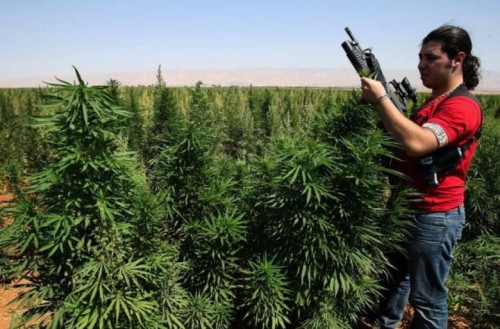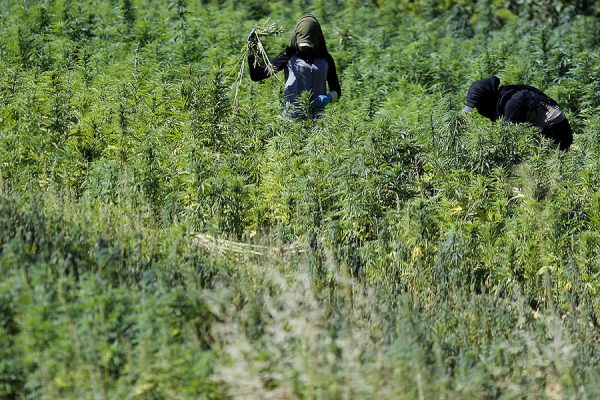
The indebted nation could benefit financially from legalizing cannabis. But legalization could create complications for Hezbollah, which draws recruits from Lebanon’s poor hashish-growing region.
For generations, residents of the impoverished flat plain of the northern Bekaa Valley have been cultivating cannabis.
The illegal enterprise has earned modest incomes for farmers but immense fortunes for the dealers who buy the cannabis in bulk and export the product to lucrative markets in Europe and the Gulf.
To defend their illicit crops, the fiercely independent Shiite tribes of the northern Bekaa do not hesitate to resort to arms when the Lebanese Army and police arrive with their bulldozers. Even Shiite Hezbollah, the dominant political power in Lebanon, struggles at times to appease the tribes.
But change could be coming to the Bekaa Valley, as the Lebanese government is mulling the advice of McKinsey & Co., a prominent global consulting firm, to legalize the cannabis crop. The aim is to generate much-needed revenues for a national economy that has been ravaged by the effects of the seven-year war in neighboring Syria and the presence on Lebanese soil of more than 1 million Syrian refugees.
The notion of legalizing cannabis cultivation has been considered for many years, but it has gained traction after McKinsey recommended the move in a 1,000-page study on ways to improve the economy of Lebanon, the world’s third-most indebted nation.
Parliamentary Speaker Nabih Berri announced last month that the Lebanese Parliament is drafting a bill to make cannabis legal for medicinal use. And a Lebanese university is proposing to establish a medicinal cannabis research center.
But in the northern Bekaa, news of the potential legalization of cannabis – or hashish as it is known locally (hashish is Arabic for grass) – is garnering mixed reactions.
“Some are for it and others against. Some think the area will become rich, but I don’t think we will benefit,” says Mohammed Hamiyah, a former mayor of the village of Taraya nestled on the hilly western flank of the Bekaa Valley.
Ali (not his real name), a cannabis farmer who has several outstanding arrest warrants, including one for a vendetta killing, stood in the center of the field and fingered a spiky plant appreciatively.
“As farmers, we do not make much money from hashish. It’s the dealers who buy the hashish from us that make all the money. This area is so poor that anything that brings some money to our tables is welcome,” he says. Like all the cannabis farmers and dealers interviewed, Ali spoke on strict condition of anonymity.
In the distance, the clatter of automatic gunfire was carried on the breeze from nearby wooded hills, signaling that another training session was under way for recruits into the militant Hezbollah organization, which operates numerous military bases in the Bekaa and wields a high level of influence.
During Lebanon’s 1975-1990 civil war, cannabis and poppy plants covered much of the northern Bekaa, generating about $500 million a year and turning some dealers and farmers into multi-millionaires.
But when the war ended in 1991, the Lebanese government and the United Nations Development Program launched a drug eradication initiative in which cannabis cultivation was to be replaced by licit crops. Farmers ceased growing hashish, but only some $17 million in funds materialized out of a pledged $300 million, and the program fizzled out by 2002.
Over the past decade, hashish cultivation has soared, in part because farmers took advantage of repeated political crises that drew the Beirut government’s attention away from the Bekaa Valley.
Tensions with Hezbollah

The area has long had a reputation for disorder and violence. Thousands of residents are wanted by the authorities for shootings, murder, car theft, narcotics and arms trafficking, and currency counterfeiting. In the Bekaa, traditional tribal codes and loyalties trump allegiance to the Lebanese state or political party, and Hezbollah is not immune.
Lately, there has been growing opposition toward Hezbollah from the Shiite tribes, a reflection of a widely held belief here that Hezbollah deliberately keeps the area impoverished in order to keep locals dependent on the Iran-backed party for their employment and social needs.
To be sure, joining Hezbollah has its rewards. A Hezbollah fighter can earn around $600 a month and benefit from the party’s extensive social welfare network of schools, hospitals, and charities.
Yet hundreds of Hezbollah fighters have been killed in Syria since 2013, when the party intervened to protect the regime of President Bashar al-Assad. The roads and village streets around the northern Bekaa are lined with crisply colored portraits of Hezbollah’s recent “martyrs.”
In May, Hezbollah and its allies won a small parliamentary majority in nationwide elections. Although Hezbollah triumphed in the northern Bekaa, many residents chose not to vote or voted for non-Hezbollah candidates in a rare sign of discontent.
Local residents also have blamed Hezbollah for the death two weeks ago of drug dealer Ali Zaid Ismael, described by the local media as “Lebanon’s Escobar,” a reference to deceased Colombian drug lord Pablo Escobar. The dealer and seven other people were killed in a bloody gun battle when Lebanese troops sought his arrest.
His death triggered a series of protests against Hezbollah, which was accused of lifting its political cover from Ismael and allowing the army to make the attempted arrest. Videos circulated on social media showing angry Bekaa residents cursing the Hezbollah leadership and burning the party’s flags, a borderline breaking of taboos.
Economic opportunity
“Hezbollah is punishing us for not voting for them in the elections,” says a resident of Hamoudieh, Ismael’s home village. “They are making a big mistake by confronting us.”
Given the level of discontent from the Shiite tribes toward Hezbollah, the legalization of cannabis cultivation could serve as a lure for Hezbollah members to quit the organization and generate an income by growing hashish.
But it remains unclear if cultivating cannabis and selling it to the Lebanese state at a price set by the government would provide sufficient income to encourage young men to stay away from Hezbollah, let alone improve socio-economic conditions in the Bekaa.
Many are pessimistic.
“It’s shameful that they [the government] think all we are good at is growing hashish,” says Mr. Hamiyah, the former mayor. “Let them give us factories and [agricultural] projects so that we can make a living. If every young man in the Bekaa is employed in a factory, no one will join Hezbollah.
CSM

Leave a Reply
You must be logged in to post a comment.